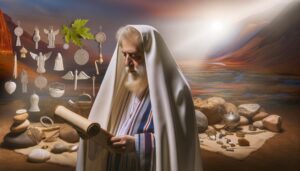Amora Meaning in the Bible: Teacher and Wisdom
The term ‘Amora‘ in the Bible refers to Jewish scholars active from approximately 200 to 500 CE. Derived from the Aramaic word ‘āmôrā’, meaning ‘speaker’ or ‘interpreter’, the Amoraim were instrumental in interpreting and expanding upon the Mishnah, thereby contributing considerably to the creation of the Talmud.
These scholars operated primarily in the Talmudic academies of Palestine and Babylonia, forging a bridge between oral traditions and written Jewish law. Their analytical and interpretive efforts established essential legal and ethical frameworks within Judaism.
For an in-depth exploration, one might consider the extensive methodologies and theological contributions of the Amoraim.

Amora Meaning in the Bible: Significance and Interpretation
| Aspect | Details |
|---|---|
| Term | Amora |
| Meaning in the Bible | While not explicitly mentioned in the Bible, “Amora” is a term associated with Jewish tradition, meaning “speaker” or “interpreter,” referring to those who explained or expanded on the Scriptures. |
| Historical Context | The term is linked to the Jewish scholars of the Talmudic era (Amoraim) who taught and interpreted the oral traditions and scriptures in synagogues. |
| Spiritual Significance | Symbolizes the importance of teaching, interpreting God’s word, and passing down divine wisdom. It reflects the value placed on understanding and conveying God’s truths. |
| Themes in the Bible | – Teaching and Wisdom: Highlighted in verses like Proverbs 4:7 (“Wisdom is the principal thing; therefore get wisdom…”). – The Role of Teachers: Reinforced in the New Testament with leaders who interpret and teach God’s Word (Ephesians 4:11). |
| Lessons for Today | Amora reminds believers of the importance of studying, interpreting, and sharing God’s Word to deepen spiritual understanding and foster faith. |
Origins of the Term ‘Amora’
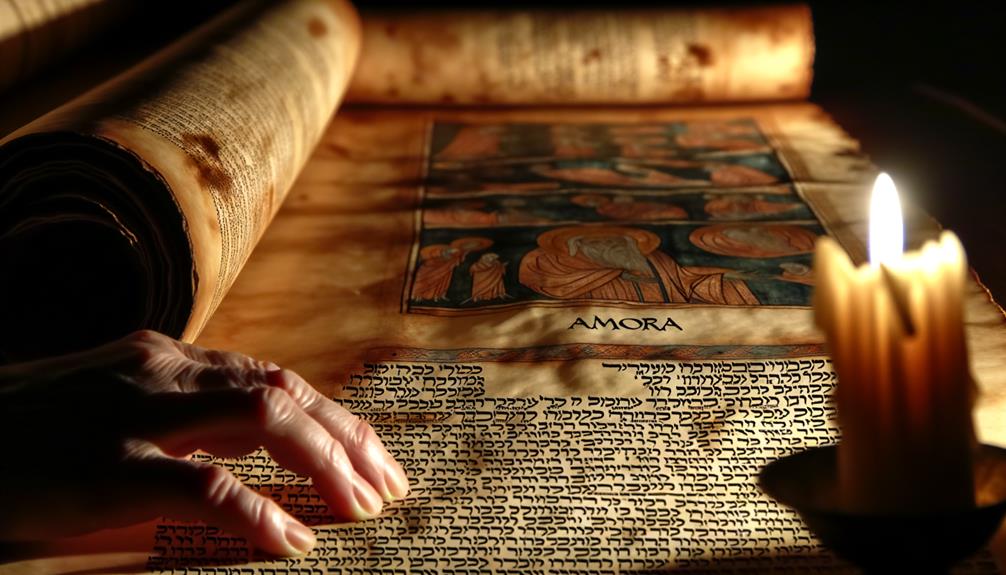
The term ‘Amora‘ originates from the Aramaic word ‘āmôrā’, meaning ‘speaker’ or ‘interpreter’, and is historically significant in the context of Jewish rabbinical literature.
Functionally, Amoraim were scholars who interpreted and expounded upon the Mishnah, which is the first major written redaction of the Jewish oral traditions. These interpretations were not merely academic exercises; they were essential for the practical application of Jewish law and ethics.
The Amoraim operated primarily in the Talmudic academies of Palestine and Babylonia, where they developed extensive commentaries that later formed the Gemara.
Consequently, the term encapsulates both a role and an era pivotal to the development of Jewish legal and ethical thought, bridging scriptural exegesis and daily life application.
Historical Context of the Amoraim
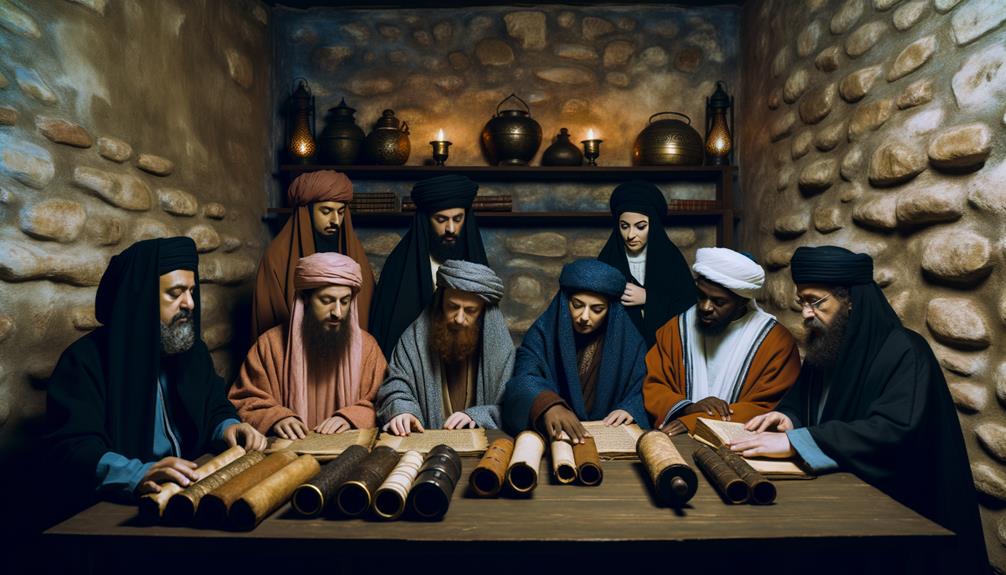
Amoraic scholarship flourished during a transformative period in Jewish history, spanning approximately from 200 to 500 CE. This era witnessed the shift from the Roman to the Byzantine Empire‘s control over the Jewish heartlands and the corresponding evolution in Jewish communal and religious life.
The Amoraim, or Jewish scholars of this period, primarily operated in the academies of Palestine and Babylonia, regions that became pivotal centers of Jewish learning. Their work involved interpreting and expanding upon the Mishnah, the codified oral traditions, culminating in the compilation of the Talmud.
This historical context provided a fertile ground for a robust intellectual tradition, where dialogues and debates among scholars greatly shaped the trajectory of Jewish legal and ethical thought.
Role in Jewish Scholarship
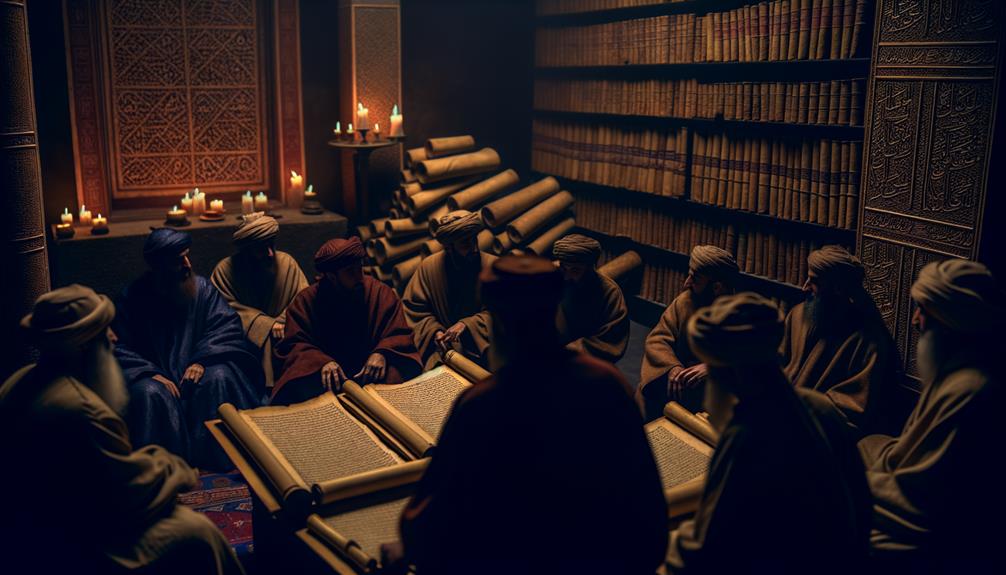
Jewish scholarship during the Amoraic period was profoundly influenced by the rigorous interpretative endeavors of the Amoraim, whose exegetical skills and intellectual rigor greatly advanced the understanding and application of Jewish law and ethics.
The Amoraim, active between 200 and 500 CE, were critical in the development and systematization of Oral Torah traditions. Their scholarly activities encompassed extensive discussions, debates, and analyses that elucidated complex legal and ethical issues, thereby providing a robust framework for Jewish jurisprudence.
They operated within established academies in both Babylon and the Land of Israel, ensuring a trans-regional discourse that enriched Jewish intellectual life.
Essentially, their contributions laid the foundational pillars for subsequent Jewish legal and ethical thought, cementing their legacy in Jewish scholarship.
Contributions to the Gemara

Central to the development of the Gemara, the Amoraim‘s contributions involved meticulous analysis and interpretation of the Mishnah, thereby creating a thorough and dynamic corpus of Jewish law and thought.
These scholars operated between the 3rd and 5th centuries CE, primarily in the academies of Babylonia and Palestine. Their interpretative efforts were not merely exegetical but also dialectical, engaging in rigorous debate to clarify and expand upon the terse statements of the Mishnah.
The Amoraim introduced innovative methodologies, including pilpul (sharp analysis) and conceptual categorization, which transformed the Mishnah into an all-encompassing legal and ethical system.
Their work laid the framework for subsequent Jewish scholarship, ensuring the Mishnah’s applicability to evolving socio-legal contexts through the ages.
Influence on the Talmud

The Amoraim greatly influenced the Talmud through their evolving rabbinic interpretations, which laid the groundwork for subsequent Jewish legal thought.
Their scholarly debates, recorded meticulously in the Gemara, reflect a dynamic process of legal and ethical reasoning.
This intellectual rigor not only shaped the Talmud’s content but also guaranteed its enduring relevance in Jewish tradition.
Rabbinic Interpretations Evolved
Rabbinic interpretations, particularly those of the Amoraim, played an essential role in the evolution of Jewish law and thought, greatly shaping the development and content of the Talmud. This period was marked by rigorous analysis and debate, which enriched the interpretive tradition and contributed to a dynamic legal framework. The Amoraim’s contributions were diverse, addressing theological, legal, and ethical dimensions.
| Aspect | Contribution | Impact |
|---|---|---|
| Theological | Developed doctrinal clarity | Enhanced religious practice |
| Legal | Codified laws | Structured legal systems |
| Ethical | Moral teachings | Guided daily conduct |
| Methodological | Analytical discourse | Fostered scholarly rigor |
| Community Practices | Rituals and customs | Unified communal identity |
Their interpretive efforts were instrumental in the Talmud’s thorough and enduring influence.
Shaping Jewish Legal Thought
Amoraic exegesis profoundly impacted the development of Jewish legal thought, embedding complex interpretative frameworks within the Talmudic discourse.
The Amoraim, active from the 3rd to 5th centuries CE, meticulously analyzed and expanded upon the Mishnah, the foundational text of Jewish oral law.
Their interpretations were instrumental in shaping Halakhic principles, offering nuanced understandings of legal statutes and ethical mandates.
By integrating diverse perspectives and methodological rigor, the Amoraim enhanced the Talmudic corpus, rendering it a dynamic and living document.
Their contributions not only preserved traditional teachings but also adapted them to evolving social and cultural contexts, ensuring the continuity and relevance of Jewish legal thought across generations.
Amoraic Scholarly Debates
Engaging in rigorous debates, the Amoraim played a pivotal role in refining and interpreting the Talmudic text, thereby shaping the intellectual and legal foundations of Jewish tradition.
These scholars, active from approximately 200 to 500 CE, contributed to the development of the Gemara, the commentary on the Mishnah.
Through dialectical discussions, they resolved ambiguities and addressed new legal scenarios, ensuring the Talmud’s relevance across generations.
The Amoraic method of debate, characterized by meticulous analysis and logical argumentation, fostered a dynamic and robust legal system.
Their debates not only elucidated Jewish law but also enriched ethical and philosophical discourse, leaving an enduring impact on Judaic studies.
The Amoraim’s contributions underscore the importance of scholarly rigor in religious interpretation.
Key Figures Among the Amoraim
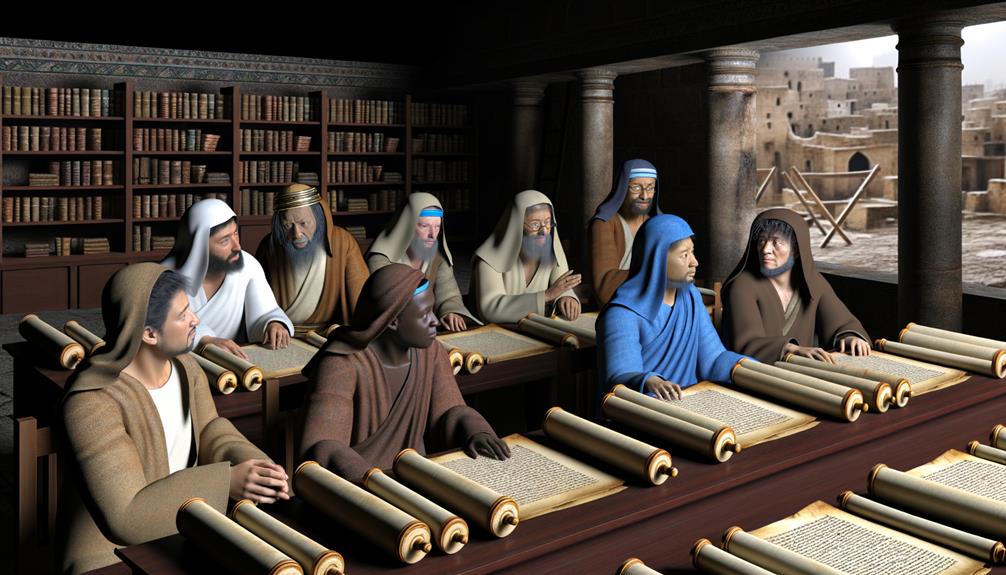
The most influential figures among the Amoraim include Rabbi Johanan and Rav, whose teachings and interpretations greatly shaped the development of the Talmud.
Rabbi Johanan, based in Tiberias, was instrumental in consolidating the Jerusalem Talmud and contributed extensively to its legal and ethical discussions.
Rav, a prominent figure in Babylonia, founded the academy at Sura, which became a central institution for Talmudic study.
Their exegetical methods and jurisprudential insights established foundational principles that guided subsequent generations of scholars.
The intellectual legacy of Rabbi Johanan and Rav underscores the dynamic nature of Amoraic scholarship, illustrating its profound impact on the evolution of Jewish legal thought and the enduring significance of their contributions within the broader tapestry of Jewish tradition.
Theological Implications
Exploring the theological implications of the Amoraim’s teachings reveals a profound interplay between legal exegesis and ethical principles, shaping the moral framework of Jewish thought. Their contributions to the Talmud have underscored the importance of integrating halakhah (Jewish law) with aggadah (narrative), thereby enriching religious understanding.
Key theological implications include:
- Divine Commandments: The Amoraim emphasized the divine origin of commandments, reinforcing their binding nature.
- Ethical Monotheism: Their teachings promoted the idea that ethical behavior is inextricably linked to monotheistic belief.
- Interpretative Authority: The Amoraim’s role in interpreting the Torah established the enduring authority of rabbinic interpretation.
- Community and Law: They highlighted the necessity of communal adherence to law for societal harmony.
These principles continue to inform Jewish theological discourse.
Legacy in Religious Thought

The legacy of the Amoraim in religious thought encompasses both their substantial influence on spiritual heritage and their profound impact on scriptural interpretation.
Their exegetical contributions have shaped the hermeneutical frameworks within which subsequent generations have understood Biblical texts.
This enduring influence underscores the foundational role of the Amoraim in the development of Judaic theological and philosophical discourse.
Spiritual Heritage Influence
In examining the spiritual heritage influence of the term ‘Amora’ within biblical contexts, one must consider its nuanced legacy in shaping religious thought and theological discourse. The term ‘Amora’ is pivotal for understanding rabbinic contributions during the Talmudic era, as it encapsulates a period marked by rigorous scholarly debate and interpretation. These rabbinic figures, known as Amoraim, played a crucial role in the transmission of oral traditions and their integration into written texts, which ultimately influenced Jewish law and practice. Additionally, their interpretations often engaged with other cultural and philosophical ideas of the time, including the concept of ‘achaia in biblical context,’ highlighting the interplay between diverse intellectual currents and religious belief. This rich tapestry of discourse laid the groundwork for future generations, ensuring that the wisdom and debates of the Amoraim would resonate throughout Jewish scholarship and beyond.
Key areas of influence include:
- Oral Tradition: The perpetuation and formalization of oral teachings, which were integral to Jewish religious practice.
- Halakhic Development: Contributions to Jewish law, shaping the legalistic framework within which Jewish life was ordered.
- Theological Concepts: Advancing and refining theological doctrines that underpinned Jewish belief systems.
- Textual Exegesis: Enhancing methods of scriptural analysis and interpretation, thereby influencing subsequent generations of scholars.
These elements underscore the profound and enduring impact of the Amoraic legacy.
Scriptural Interpretation Impact
Building upon the spiritual heritage influence of the Amoraic period, the impact of Amoraic contributions on scriptural interpretation remains a cornerstone of Jewish religious thought.
The Amoraim, active between the 3rd and 5th centuries CE, played a pivotal role in the development of the Talmud, offering exegetical insights that have shaped subsequent Jewish exegesis.
Their hermeneutical methods, emphasizing dialectical reasoning and rigorous debate, facilitated a dynamic and layered understanding of the Torah.
This legacy has permeated religious scholarship, fostering a tradition of interpretation that balances textual fidelity with innovative thought.
Consequently, the Amoraic contributions have indelibly influenced Jewish legal, ethical, and theological discourses, underscoring their enduring relevance in contemporary religious studies.
Conclusion
The term ‘Amora‘ encapsulates the profound scholarly endeavors of the Amoraim, whose contributions greatly shaped Jewish intellectual tradition.
Through their meticulous exegesis and dialectical methods, the Amoraim not only fortified the Gemara but also cemented their influence on the Talmud.
Indeed, their legacy reverberates through centuries, embodying the dynamic interplay between tradition and interpretation.
As custodians of theological wisdom, the Amoraim’s impact remains a cornerstone in the edifice of religious thought and Jewish scholarship.



